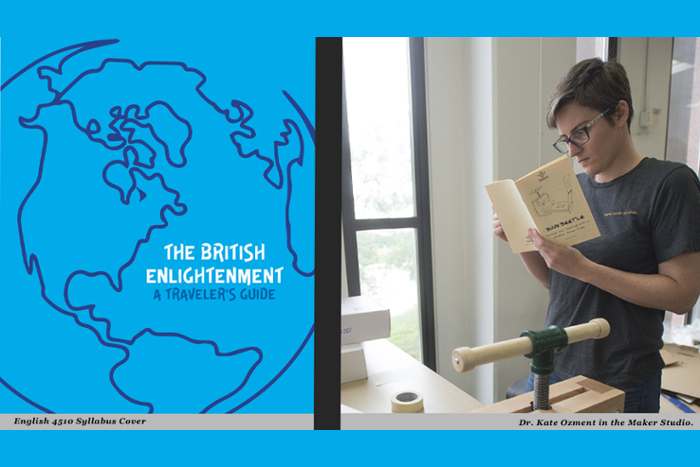Bringing the 18th Century to Modern Times
November 16, 2020

For English Professor Kate Ozment, the 18th Century holds literary artifacts important to history, especially the Black and indigenous people's voices. Ozment's continued research and reading of 18th Century Black and Indigenous writing have won her the American Society for Eighteenth-Century Studies Innovative Course Design (ASECS) competition for her course "The British Enlightenment: A Traveler's Guide."
As the winner of the ASECS Course Design, Ozment will receive $500 for her newly designed course. The class is senior-level and was taught for the first time in the spring of 2020.
“We have been continually impressed with Dr. Ozment's ingenious course designs. As an 18th Century specialist she introduces students to pamphlet culture via her syllabi, which gives them a material access point to the period,” said Dr. Alison Baker, English and Modern Languages Department Chair
The course studies the writing of Black and indigenous people from 1660-1785. "At this period in history, Black and indigenous writing became part of the English literary canon through two methods: writing about their conversion to Christianity or through telling stories of their trauma to push for abolitionism."
The readings in this course can be challenging, not only because students are unpacking the language and nuances of the era, but because students need to take a critical approach to look past the words written and understand the underlying significance of the literature.
"You have writers like Phillis Wheatley (the first African American woman who published a book of poetry) who seems to be praising her enslavers for Christian salvation. In reality, Wheatley carefully uses coded in language; she is not thankful for being enslaved. But she's so careful because she is writing to an audience that believed she was less than human," said Ozment.
The 18th Century may seem like it has no application in our time, but Ozment states that focusing on the Black and indigenous voices are more critical now than ever before. "The Enlightenment was called the "Age of Reason" and popularized things like the scientific method and beliefs like "all men are created equal." The United States was formed while debates about natural rights, reason, and how the mind works were happening."
Teaching and focusing on the Black and indigenous voices throughout history is critical to understanding the marginalized community's long, violent, and laborious times throughout history – including the 18th Century. "If we only teach the dominant ideology of this period (for example, if we only celebrate Americans as upstart revolutionaries and not settler-colonialists on indigenous land), we continue to erase the histories of Black and indigenous people who have resisted state-sanctioned violence for centuries. If we are not a part of these communities, we are also less prepared to serve as allies that can affirm the dignity of Black lives and indigenous sovereignty," said Ozment.
Earlier this year, Ozment received the Junior Fellow of the Andrew W. Mellon Society of Fellows in Critical Bibliography at Rare Book School due to her feminist bibliography work.
“She also has expertise in Digital Humanities and co-runs the EML Role-Playing Game club, Split Party Infinitives, so she works game theory into her class plans too. The result is a brilliantly orchestrated, wonderfully engaging class experience,” said EML Chair Dr. Baker.
Ozment stated that the fellowship classes are all outside of the Anglo-American world. "They continue to give me a greater perspective on how to responsibly teach books as cultural artifacts. While specialization is in English literature, the country we live in is much more diverse than that, and this approach helps me make the literature of the past relevant for contemporary Americans."
Ozment shared that her work is just starting and that it's essential to continue to learn and understand the writing of Black and indigenous people.
"I still have a lot to learn about how to teach Black and indigenous writing in my period, but if anything has been made clear to me in the last four years, it is that English literature professors continuing to perpetuate the myth of a white, English haven only props up white supremacy," said Ozment.